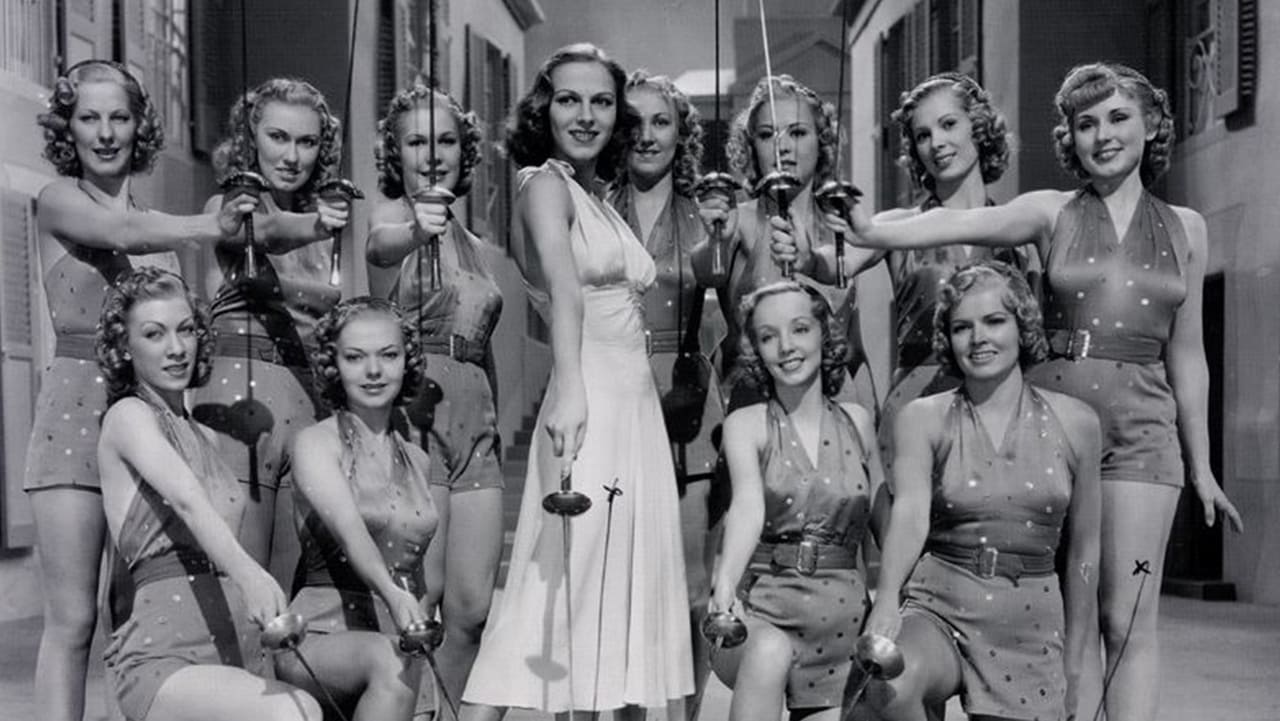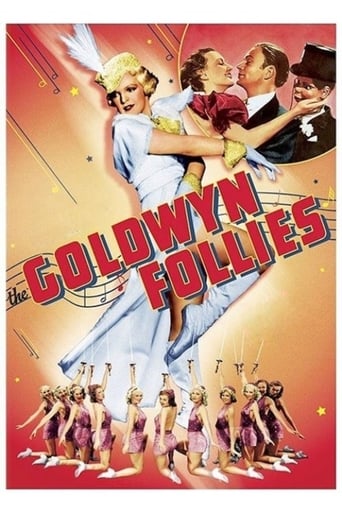roddekker
For starters - (If nothing else) - I thought that this 1938 film's Technicolour effects were nothing short of being absolutely astounding to behold. You could clearly tell that great attention to colour co-ordination was very much a major issue in this $2 million production.Now almost 80 years old - The Goldwyn Follies definitely had its good points, as well as its not-so-good points. Featuring 7 Gershwin songs - This picture's story of comedy, music, and romance was obviously very much a product of its time. And, because of this it did make it difficult for this viewer not to scrutinize it just a little too critically.... (But I still give it a 6-star rating) And, finally - When it came to watching famed ventriloquist, Edgar Bergen constantly moving his lips whenever it was his puppet/sidekick Charlie McCarthy's turn to speak - I thought that he was one of the most amateurish and unconvincing performers in his specialized profession that I have ever seen.
calvinnme
One thing you can say about Sam Goldwyn's ventures into musicals. He could either hit them out of the park ("Whoopee", "Palmy Days", "The Kid From Spain", etc.), he could miss completely ("One Heavenly Night"), or he could come up with a film that really is a bit of a mess but enjoyable for the classic film lover. The problem here seems to be that the film is trying to imitate to some degree the Warner Busby Berkeley films of 1933, the problem being that it is five years later. You'd think that of all people Goldwyn would have gotten that, since Busby Berkeley was directing his dance numbers in his Eddie Cantor films before Warner Bros. got a hold of him. Kenny Baker is obviously trying to stand in for Dick Powell, and he's good enough, it's just that musicals were transitioning to a different phase by 1938, the year this film was released. Thus the backstage banter between chorus girls doesn't come off very well after the code. The Ritz Bros. are obviously trying to stand in for the Marx Bros. and they do have a funny routine about a cat, but in the end they do get a bit tiresome. The film does have the dashing Adolphe Menjou, and he improves just about every film he's in including this one. The Technicolor is gorgeous and the Gershwin music is wonderful.However, the modern viewer has one strategic advantage over the viewer that saw this in the first-run. We're not trapped in the perspective of a 1938 movie-goer so we can enjoy the film for what it is - some great musical numbers with a little good comedy and a lot of silliness.One thing I don't get. This film first appeared on DVD as part of the giant Hollywood Musicals Collection late in 2008. One of the other films making its debut on DVD was the long awaited "Whoopee" starring Eddie Cantor. Why did this film get an individual pressed release rather than "Whoopee"? Was MGM allergic to money or something? Fortunately Warner Archives came to the rescue and procured the rights to almost everything Goldwyn and did release "Whoopee", although it was burned not pressed.
Terrell-4
Probably the only reason for remembering The Goldwyn Follies is that it's the movie George Gershwin was working on when he died at 38 of a brain tumor. In truth, the movie is a mish- mash, although a good-natured one, involving comedy bits, musical numbers and what Goldwyn considered "class." The best thing about the film are two George and Ira Gershwin songs that are as fresh and wise today as when they were written, "Our Love Is Here to Stay" and "Love Walked In." The story line is as thin as a thread, designed to keep the numbers coming and to provide some fun at Hollywood's expense. Ben Hecht is credited with the screenplay. He artfully places some banderillas that probably puckered the skin of several types of Hollywood denizens, from producers to divas to sycophants to...you get the idea. Hollywood producer Oliver Merlin (Adolphe Menjou) has convinced himself he needs someone to tell him honestly about the new movie he's working on, someone who will represent the big audience out there. On a location shoot he meets a young woman who fits the bill. She's Hazel Dawes (Andrea Leeds), gentle, sincere and honest. "I'm a producer of movies," he tells her. "I get my wagonloads of poets and dramatists, but I can't buy common sense. I cannot buy humanity!" "Well, I don't know why, Mr. Merlin. There's an awful lot of it," Hazel says. Merlin looks at her impatiently. "Yes, I know," he says, "but the moment I buy it, it turns into something else, usually genius, and it isn't worth a dime. Now, if you could stay just as simple as you are, you'd be invaluable to me. I'll put you on my staff. I'll give you a title, 'Miss Humanity.' Don't rush, you can finish your ice cream soda." Merlin brings her to Hollywood and consults her on everything from script changes to plot developments. Of course, she also meets a young man, Danny Beecher (Kenny Baker), who has a great tenor and a way with flipping hamburgers. Merlin makes changes in his movie. There's love, a brief misunderstanding quickly resolved and then a happy ending. All this is just a clothes line to hang the comedy and musical numbers on. This is a review movie and Goldwyn gives us a lot to watch, including his idea of culture. This has usually meant excerpts from opera, over-produced and sung straight ahead. Here, we get a bit of an aria from Traviata. We also get a genuinely stunning water-nymph ballet danced by Vera Zorina, choreographed by George Balanchine and with music by Vernon Duke. But we also get the Ritz Brothers, frenetic, anarchic and, above all else, loud. They were big stuff in the Thirties. I think nowadays they'd be an acquired taste. Bobby Clark, a great burlesque, vaudeville and stage star, shows up as a casting director, all leers and cigars. Edgar Bergen and Charlie McCarthy make several appearances. I've always been intrigued at how Bergen could maintain such a sharply split personality between himself and his wooden pal. Bergen may be bland but McCarthy really is funny, especially when looking at tall showgirls. Phil Clark, a comic big in vaudeville and radio, shows up in a recurring gag and finally faces off with McCarthy. There's even Alan Ladd in a brief bit as one of several awful singers auditioning for a part in Merlin's movie. Kenny Baker, who was a singer much like a young Dick Powell but without the cockiness, does full justice to the two great Gershwin songs. The Goldwyn Follies sprawls all over the place, still I like it. First, because it provides a look at some stars we've nearly forgotten, people like Edgar Bergen, Vera Zorina, Phil Baker and Bobby Clark. Even the Ritz Brothers. These were people who knew their stuff. They were professionals and it comes through. Second, those Gershwin songs. They are so good they lift the movie whenever Baker sings them. For me, they create a bittersweet feeling. George Gershwin was at the height of his powers when he wrote them. What on earth could he have created if he'd lived? So here's to George and Ira... The more I read the papers, the less I comprehend. / The world and all it's capers and how it all will end. Nothing seems to be lasting, but that isn't our affair. / We've got something permanent, / I mean in the way we care. It's very clear, our love is here to stay. / Not for a year, but ever and a day. The radio and the telephone / And the movies that we know, / May just be passing fancies and in time may go. But, oh my dear, our love is here to stay. / Together we're going a long, long way. In time the Rockies may crumble, / Gibraltar may tumble, they're only made of clay. / But our love is here to stay.

